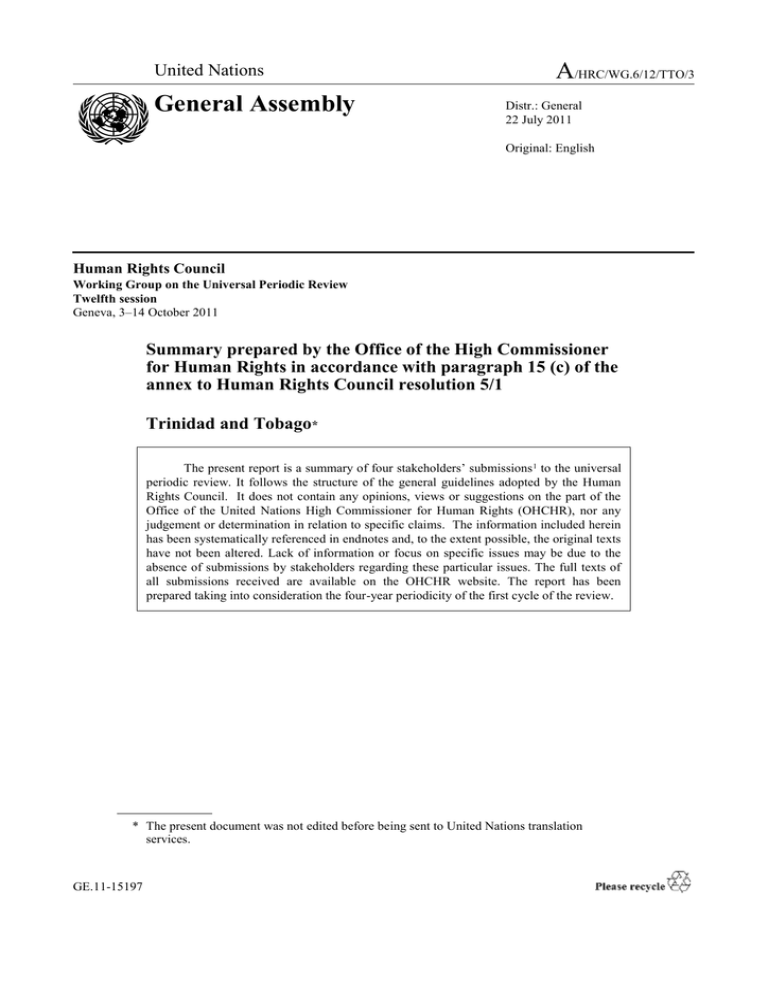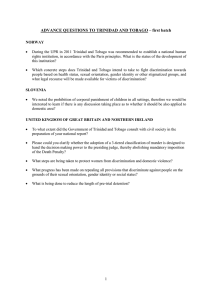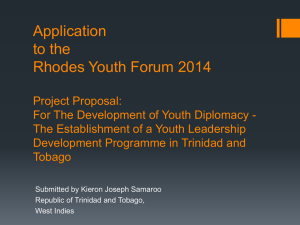
United Nations
General Assembly
A/HRC/WG.6/12/TTO/3
Distr.: General
22 July 2011
Original: English
Human Rights Council
Working Group on the Universal Periodic Review
Twelfth session
Geneva, 3–14 October 2011
Summary prepared by the Office of the High Commissioner
for Human Rights in accordance with paragraph 15 (c) of the
annex to Human Rights Council resolution 5/1
Trinidad and Tobago*
The present report is a summary of four stakeholders’ submissions 1 to the universal
periodic review. It follows the structure of the general guidelines adopted by the Human
Rights Council. It does not contain any opinions, views or suggestions on the part of the
Office of the United Nations High Commissioner for Human Rights (OHCHR), nor any
judgement or determination in relation to specific claims. The information included herein
has been systematically referenced in endnotes and, to the extent possible, the original texts
have not been altered. Lack of information or focus on specific issues may be due to the
absence of submissions by stakeholders regarding these particular issues. The full texts of
all submissions received are available on the OHCHR website. The report has been
prepared taking into consideration the four-year periodicity of the first cycle of the review.
* The present document was not edited before being sent to United Nations translation
services.
GE.11-15197
A/HRC/WG.6/12/TTO/3
I. Background and framework
A.
Scope of international obligations
1.
Amnesty International (AI) recommended that Trinidad and Tobago ratify without
reservations the Second Optional Protocol to the International Covenant on Civil and
Political Rights, aiming at abolition of the death penalty. 2 AI further recommended that
Trinidad and Tobago ratify the Convention against Torture and Other Cruel, Inhuman or
Degrading Treatment or Punishment and its Optional Protocol, the International
Convention for the Protection of All Persons from Enforced Disappearance and; the
International Convention on the Protection of the Rights of All Migrant Workers and
Members of their Families.3
2.
AI also recommended that Trinidad and Tobago re-accede without reservations to
the first Optional Protocol to the International Covenant on Civil and Political Rights and to
the American Convention on Human Rights. 4
B.
Constitutional and legislative framework
3.
Global Initiative to End All Corporal Punishment of Children (GIEACPC) reported
that, as at January 2011, the Children (Amendment) Act 2000 was not in force. 5
C.
Policy measures
4.
AI reported that the 2009 draft National Policy on Gender and Development, which
had not yet been adopted, acknowledged that gender based violence was an obstacle to
national development, and indicated a number of measures to be implemented including:
the adoption of legislation on sexual harassment; the revision of existing legislation with a
view to improve legal remedies for all forms of gender based violence; the creation of
centralized system for data collection; the establishment of specialized Rape and Sexual
Offences Units within police stations; and strengthening the capacities and the effectiveness
of shelters for victims and their children.6 AI recommended that Trinidad and Tobago
ensure the adoption and the co-ordinated implementation of the National Policy on Gender
and Development.7 Joint Submission 2 (JS2) noted that the 2009 draft policy categorically
excluded from its scope any treatment of sexual orientation and homosexuality. 8
II. Promotion and protection of human rights on the ground
Implementation of international human rights obligations, taking into
account applicable international humanitarian law
1.
Equality and non-discrimination
5.
JS2reported that the Equal Opportunity Act (2000) (Ch. 22:03), explicitly excluded
from its application “sexual preference or orientation. 9
2.
Right to life, liberty and security of the person
6.
AI reported that, although there had been no executions in Trinidad and Tobago
since 1999, death sentences continued to be handed down by the courts. By the end of 2010
2
A/HRC/WG.6/12/TTO/3
there were at least 40 prisoners on death row. In Trinidad and Tobago, the death sentence
was mandatory for convictions of murder.10
7.
AI expressed concern at a Bill aimed at reforming the Constitution in relation to the
implementation of the death penalty submitted by the government to Parliament in January
2001. It noted that this Bill would have permitted the execution of people sentenced to
death even if they had been on death row for more than five years, thus circumventing a
1993 ruling by the highest court of appeal for Trinidad and Tobago, the Judicial Committee
of the Privy Council in London that such a delay constitutes cruel and inhuman treatment
and that in such situations the death penalty should be commuted to life imprisonment.
Furthermore, the Bill retained the mandatory imposition of the death penalty for certain
categories of murder. The Bill was defeated in the Parliament on 28 February 2011, as the
opposition claimed that the proposed amendments would be ineffective in facilitating the
implementation of the death penalty. AI was concerned that the evident contradiction with
international human rights law and standards was not discussed in the parliamentary debate
and that the Bill could be reintroduced in Parliament after six months. 11
8.
AI recommended that Trinidad and Tobago: immediately establish a moratorium on
executions with a view to abolishing the death penalty, and that all death sentences be
commuted without delay to terms of imprisonment; immediately remove all provisions in
national law which are in breach of international human rights law, in particular by
abolishing all provisions which provide for mandatory death sentences; and ensure rigorous
compliance in all death penalty cases with international standards for fair trial. 12
9.
AI indicated that excessive use of force by the police service was widespread, as was
evident from the large number of alleged unlawful killings and ill-treatment cases. At least
40 people were reported to have been killed by police during 2008, and at least 39 people in
2009. In most cases, police officers involved in the killings claimed they acted in selfdefence. However, in some cases, witness testimonies and other evidence suggested the
killings might have been unlawful. Many killings also sparked violent protests among the
communities in which they took place.13
10.
AI reported that the professional conduct of the police service had been scrutinized
on a number of occasions, especially in the light of the high incidence of violent crime and
the failure to bring police officers responsible for abuses to justice. 14
11.
JS2 referred to reports that several men in same-sex-practicing networks in Trinidad,
who sought sexual partners on a popular internet site had, since 2007, been victims of a
pattern of crimes, which in the worst instances, included kidnapping, imprisonment, torture
and robbery. Most did not pursue police action and the two who did reported sloppy
investigation. JS2 stated that because the sexual expression of same-sex desire is treated as
criminal in the law men are often forced into hiding when they become the victims of
opportunistic crimes."15
12.
AI indicated that gender-based discrimination and violence against women and girls,
including sexual violence, were widespread and provided figures on gender violence
indicating that it was increasing.16 AI indicated that it was believed that domestic crimes
went under-reported mainly because the police was not adequately trained in how to deal
with cases of violence against women.17
13.
GIEACPC reported that corporal punishment of children was lawful in the home, in
public and private schools, in the penal system and in alternative care settings.18
14.
GIEACPC stated that corporal punishment is lawful in the home and that the
Children Act (1925) confirms “the right of any parent, teacher, or other person having the
lawful control or charge of a child or young person to administer reasonable punishment to
such child or young person”.19 GIEACPC also indicated that corporal punishment of
3
A/HRC/WG.6/12/TTO/3
children is lawful in public and private schools under the same article of the Children Act.
It is prohibited in the Children (Amendment) Act 2000, but as of January 2011 this act had
not come into force. The Education Act 1996 makes no reference to corporal punishment. 20
15.
GIEACPC added that within the penal system, corporal punishment had not yet been
completely abolished as a sentence for crimes. The Miscellaneous Provisions (Children)
Act (2000) prohibited corporal punishment as a sentence for persons under 18, but did not
repeal all laws which allow persons under 18 to be sentenced to corporal punishment.
Additionally, the Children Act provides for a child or young person found guilty of an
offence to be ordered to be whipped. This provision is also be repealed by the Children
(Amendment) Act 2000 (article 24), but, as stated, as of January 2011 this Act was not in
force. Furthermore, the Larceny Act 1919 provides for boys under 16 to be liable to
corporal punishment.21
16.
Furthermore, GIEACPC indicated that corporal punishment was lawful as a
disciplinary measure in penal institutions. The Young Offenders (Male) Detention
Regulations, pursuant to the Young Offenders Detention Act (1926), authorise corporal
punishment with a rod to be ordered in detention institutions by the Inspector,
Commissioner or Assistant Commissioner of Prisons, up to 18 strokes, 14 strokes and 9
strokes respectively.22
17.
It was also noted that under the Children Act, children convicted of offences may be
sent to a certified industrial school or a certified orphanage, where corporal punishment is
lawful under article 22 of the Children Act. Corporal punishment is lawful in alternative
care settings under the Children Act. 23 GIEACPC expressed the hope that the Review will
highlight the importance of prohibiting all corporal punishment of children in all settings,
including in the home and all forms of alternative care, and urged the Government to enact
legislation to achieve this as a matter of priority. 24
3.
Administration of justice and the rule of law
18.
AI reported that shortages of judges and lawyers translated into heavy backlogs in
the courts and lengthy pre-trial detentions.25 AI recommended that Trinidad and Tobago
take adequate measures aimed at reducing court backlogs, expedite trials and reduce the
length of pre-trial detentions and that it increase the number of attorneys-at-law in the
Department of Public Prosecutions.26
19.
AI added that inadequate protection of witnesses was a serious concern. Several
state witnesses had been killed, and many witnesses reportedly declined to give evidence at
the last moment because of threats. 27 AI recommended further that Trinidad and Tobago
provide adequate protection to all state witnesses in criminal trials, including by enhancing
the Witness Protection Programme.28
20.
AI also reported that access to justice for victims of sexual offences was
unsatisfactory. In 2009 the conviction rate for sexual offences was only 3 per cent. 29 AI
stated that this was notably due to reluctance on the part of victims to go to court for fear of
victimization; delays in the investigation and judicial processes; lack of confidence in the
judicial process; and a lack of support services. 30
21.
AI recommended that Trinidad and Tobago: establish specialized rape and sexual
offences units within the police stations and to train police officers in adequately dealing
with complaints of domestic violence; ensure satisfactory investigation and prosecution of
cases of gender-based violence; increase the number - as well as strengthen the capacities
and effectiveness - of shelters for victims of gender-based violence and their children. 31
22.
AI reported that, on 1 January 2007, an amendment to the Police Complaints
Authority Act entered into force, enabling the institution to investigate criminal offences
4
A/HRC/WG.6/12/TTO/3
involving police officers, corruption and serious misconduct. However, the law contained
ambiguities about these powers, and in its 2008 annual report the Police Complaints
Authority recommended a further amendment in order to clarify the scope of the Act. The
Authority’s work was also hampered by it having no director for almost three years, until
December 2010. A backlog of 1000 complaints was reported in February 2011. 32
23.
AI recommended that Trinidad and Tobago ensure that all complaints of human
rights violations by the security forces are subject to immediate, thorough and independent
investigation, and that those found responsible are brought to trial in an expeditious
manner; amend the Police Complaint Authority Act accordingly and; ensure that adequate
resources are allocated to the Police Complaint Authority. 33
4.
Right to privacy, marriage and family life
24.
JS2 reported that child marriage remained legal in specific religious traditions:
marriages of minor girls as young as 12 years and boys as young as 16 were legitimized by
the Muslim Marriage & Divorce Act (1961), as were those of minor girls as young as 14 by
the Hindu Marriage Act (1945) and 16 (the age of consent) by the Orisa Marriage Act
(1999).34
25.
AI, JS1 and JS2 indicated that homosexual activity was criminalized in Sections 13
and 16 of the Sexual Offences Act relating to buggery and serious indecency.35 AI
recommended that Trinidad and Tobago repeal all provisions that criminalize same sex
relations, including in the Sexual Offences Act.36 JS1 made a similar recommendation. 37
26.
JS2 also mentioned that the Administration of Estates Act (2000) , the
Cohabitational Relationships Act (1998) and the Domestic Violence Act (1997) all
provided recognition and protection for non-marital cohabitational relationships, but
defined these relationships as between persons of the opposite sex.38 JS2 reported that the
Government proposed in 2011 a “national referendum” to determine if same-sex
relationships should be recognized by the state.39
5.
Freedom of religion or belief, expression, association and peaceful assembly and right
to participate in public and political life
27.
JS2 referred to the delay in registering a non-profit organisation National Pride: The
Trinidad & Tobago Society Against Sexual Orientation Discrimination, as the Government
was concerned whether the purpose of the corporation was to promote something illegal. 40
6.
Right to social security and to an adequate standard of living
28.
JS2 mentioned the national HIV strategic plan 2010-2015 and indicated that national
HIV spending allocated from 2002 to 2009 on all “most-at-risk populations” was less than
7 per cent.41 JS2 indicated that, in available sampling, HIV prevalence among men who
have sex with men had been measured at 20 per cent, four to eight times higher than
estimated national rates of HIV.42
29.
JS2 reported that the Offences Against the Person Act (1925) establishes that
abortions are criminal when “unlawfully” procured. It added that prevailing case law
provided that termination of pregnancy would be lawful to save the life of a pregnant
woman or to preserve her physical and/or mental health, and requires the corroboration of
two medical practitioners. However, JS2 indicated that this provision was subject to
widespread speculation and uncertainty and that unsafe abortions were a major cause of
maternal mortality and hospital admissions.43
5
A/HRC/WG.6/12/TTO/3
7.
Right to education and to participate in the cultural life of the community
30.
JS2 mentioned that the Trinidad and Tobago’s Minister of Education announced in
Parliament in January 2011 that in the past four years seven primary school girls had to
leave school because of their pregnancies.44
31.
JS2 reported that Trinidad and Tobago had no clear strategy or designated approach
for school-based health and family life education (HFLE), which had been formally
introduced in only nine of 198 secondary schools and in five of 544 primary schools.45
8.
Migrants, refugees and asylum-seekers
32.
AI reported that the Immigration Act prohibited entry into Trinidad and Tobago of
“prostitutes, homosexuals or persons living on the earnings of prostitutes or homosexuals,
or persons reasonably suspected as coming to Trinidad and Tobago for these or any other
immoral purposes”.46 AI recommended that Trinidad and Tobago repeal provisions in the
Immigration Act that were discriminatory against lesbian, gay, bisexual and transgender
persons.47
III. Achievements, best practices, challenges and constraints
N/A
IV. Key national priorities, initiatives and commitments
N/A
V. Capacity-building and technical assistance
N/A
Notes
1
2
3
4
5
6
The stakeholders listed below have contributed information for this summary; the full texts of all
original submissions are available at: www.ohchr.org. (One asterisk denotes a non-governmental
organization in consultative status with the Economic and Social Council. Two asterisks denote a
national human rights institution with “A” status)
Civil society
AI
Amnesty International, London, United Kingdom of Great Britain and
Northern Ireland*;
GIEACPC
Global Initiative to End All Corporal Punishment of Children, London, United
Kingdom of Great Britain and Northern Ireland;
JS1
Joint Submission 1 presented by: ARC International, London, United
Kingdom of Great Britain and Northern Ireland; International Lesbian, Gay,
Bisexual, Trans and Intersex Association (ILGA ) and ILGA-Europe*,
Brussels, Belgium;
JS2
Joint Submission 2 presented by : Family Planning Association of Trinidad
and Tobago (FPATT); the Coalition Advocating for Inclusion of Sexual
Orientation (CAISO) and the Sexual Rights Initiative (SRI).
AI, p. 4.
AI, p. 5.
AI, p. 5.
GIEACPC, p. 2.
A/HRC/WG.6/12/TTO/3
6
7
8
9
10
11
12
13
14
15
16
17
18
19
20
21
22
23
24
25
26
27
28
29
30
31
32
33
34
35
36
37
38
39
40
41
42
43
44
45
46
47
AI, p. 4.
AI, p. 5.
JS2, para. 12.
JS2, paras. 1, 10 and 17.
AI, p. 1.
AI, pp. 1–2.
AI, p. 4.
AI, p. 2.
AI, p. 3.
JS2, para. 4.
AI, p. 3.
AI, pp. 3–4.
GIEACPC, p. 2.
GIEACPC, p. 2.
GIEACPC, p. 2.
GIEACPC, p. 2.
GIEACPC, p. 2.
GIEACPC, p. 2.
GIEACPC, p. 1.
AI, p. 3.
AI, p. 5.
AI, p. 3.
AI, p. 5.
AI, p. 4.
AI, p. 4.
AI, p. 5.
AI, p. 3.
AI, p. 5.
JS2, para. 16.
AI, p. 2; JS1 p. 1; JS2, paras. 2 and 7.
AI, p. 4.
JS1, p. 3.
JS2, para. 2.
JS2, para. 9.
JS2, para. 10.
JS2, para. 11.
JS2, para. 11.
JS2, para. 15.
JS2, para. 13.
JS2, para. 13.
AI, p. 2.
AI, p. 4.
7


